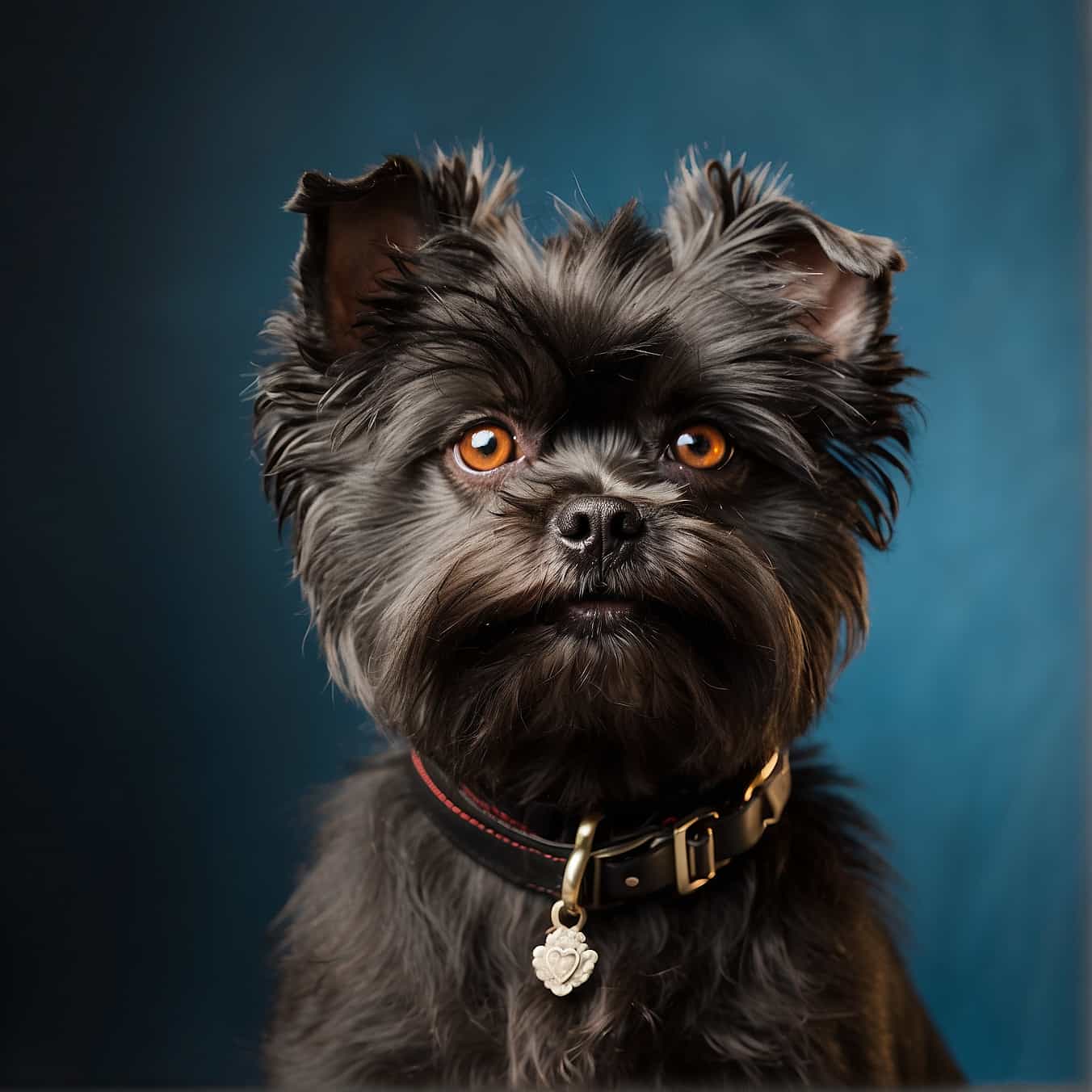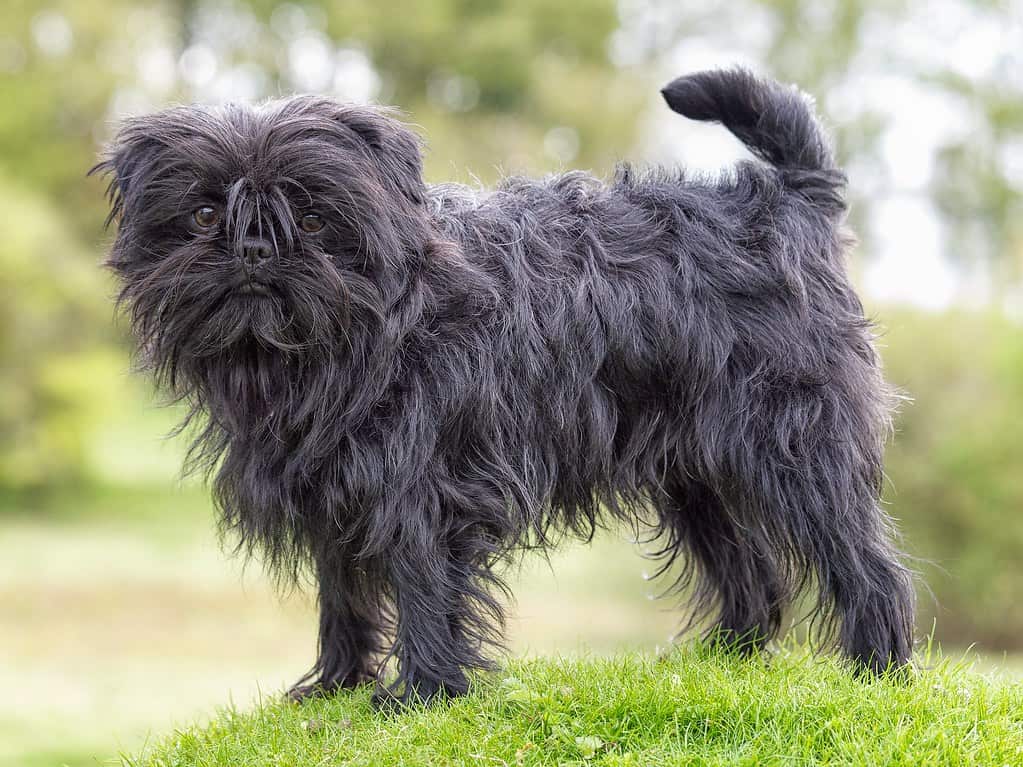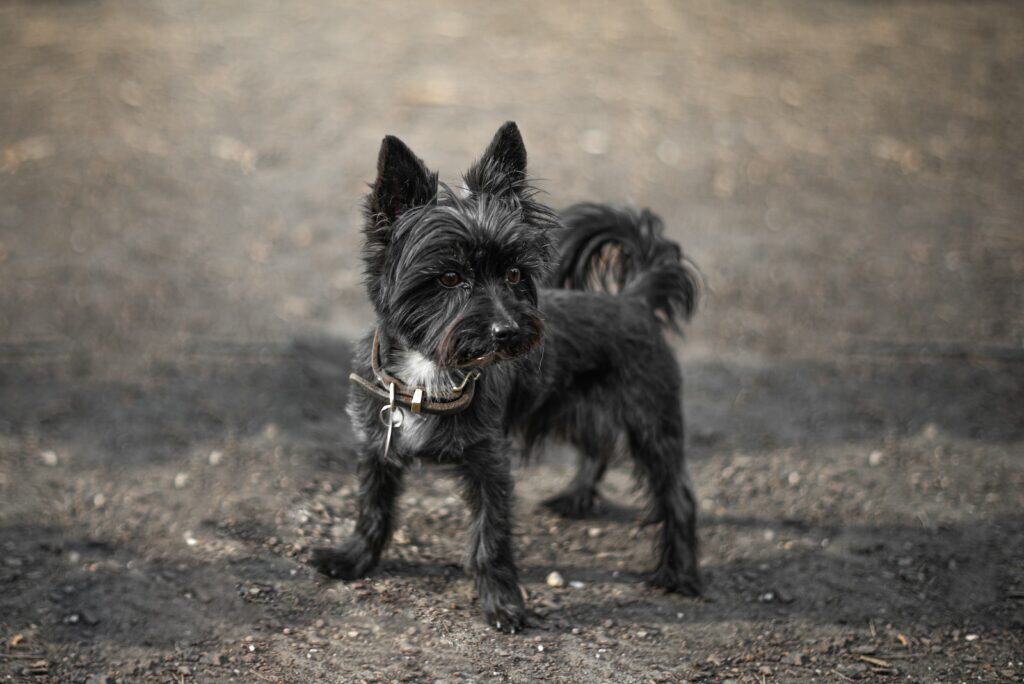The Affenpinscher, often referred to as the monkey terrier, is a small but sturdy toy breed known for its charming personality and distinct appearance. With a mischievous expression and a lively disposition, this breed is a delightful companion that brings joy and laughter to households around the world.

| Category (Explanation) | Breed Information |
|---|---|
| Year of Breed Conception | 17th century |
| Country of Origin | Germany |
| Weight (lbs & kg) (Male) | 7-10 lbs (3-4.5 kg) |
| Weight (lbs & kg) (Female) | 7-10 lbs (3-4.5 kg) |
| Coat Type | Dense, wiry coat |
| Color Variations | Black, gray, silver, black and tan |
| Shedding Level (Low, Moderate, High) | Low to Moderate |
| Height (cm & in) | 9-12 inches (23-30 cm) |
| Breed Size | Toy |
| Trainability (Low, Moderate, High) | Moderate |
| Mental Needs (Low, Moderate, High) | Moderate |
| Intelligence Level (Low, Moderate, High) | High |
| Energy Level (Low, Moderate, High) | Moderate |
| Agility (Low, Moderate, High) | Moderate |
| Loyalty (Low, Moderate, High) | Moderate |
| Playfulness (Low, Moderate, High) | High |
| Exercise Needs | Moderate exercise and playtime |
| Guarding Proficiency (Low, Moderate, High) | Low |
| Sociability with Children (Low, Moderate, High) | Moderate |
| Barking Level (Low, Moderate, High) | Moderate |
| Digging Tendency (Low, Moderate, High) | Low |
| Destructive Behavior (Low, Moderate, High) | Moderate |
| Drooling Level (Low, Moderate, High) | Low |
| Obedience Level (Low, Moderate, High) | Moderate |
| Apartment Friendly (Yes/No) | Yes |
| Inherent Prey Drive | Moderate |
| Physical Risk to Others (Low, Moderate, High) | Low |
| Travel Fatality Risk (Low, Moderate, High) | Low |
| Allergen Potential | Low |
| Health Concerns (List of Common Health Concerns) | Patellar Luxation, Heart Issues |
| Average Life Expectancy (Life Expectancy in Years) | 12-15 years |
Woof Mastery is reader supported and our articles may contain affiliate links.
Instead of running third party ads that we have no control of we only use links from high-quality companies we are directly partnered with. Making use of these links come at no cost to you our reader, and in many cases have the extra benefit of discounted rates or sign up bonuses.
If you’re interested you can read more about our affiliate policy here.
We appreciate your support and always insure that the products and services we recommend are high-quality, helpful and relevant to the subject at hand!
The Affenpinscher, originating from Germany, has a history dating back several centuries. Bred to be a skilled ratter on farms and in homes, these small terriers were valued for their ability to control rodent populations. Over time, their charming appearance and lively demeanor led them to become cherished companions of European nobility, earning them the nickname monkey terrier due to their monkey-like faces and playful antics.

The Affenpinscher stands out with its charming and mischievous personality. Despite its small size, it possesses a confident and lively demeanor, bringing joy and laughter to those around it. Its distinctive appearance, often likened to a monkey terrier, adds to its uniqueness, making the Affenpinscher a delightful and entertaining companion with a heart full of playfulness.
The Affenpinscher’s traditional role traces back to its origins in Germany, where it was prized for its skills as a ratter on farms and in homes. This small but confident terrier played a crucial role in controlling rodent populations, showcasing its agility and determination. Over time, the Affenpinscher’s lively demeanor and charming appearance led it to become a beloved companion of European nobility, transitioning from a skilled working terrier to an entertaining and affectionate household companion.
Affenpinschers are known for their charming and mischievous personalities. Despite their small size, they exude confidence and liveliness. They are playful and affectionate companions, often forming strong bonds with their families. Affenpinschers are alert and intelligent, showcasing a spirited nature. Their friendly disposition and entertaining antics make them delightful additions to households, bringing joy and laughter to those fortunate enough to share their lives with these charismatic terriers.
Affenpinschers typically have a confident and alert temperament. They are known for their lively and affectionate nature, forming strong bonds with their families. However, their small size might make them prone to display bold behavior. Proper training and socialization are essential to manage their confidence and prevent any undesirable behaviors. Affenpinschers can be stubborn at times, requiring patient training. While they can get along well with children, supervision is recommended to ensure compatibility. Their spirited personality and affectionate demeanor make them delightful companions with the right guidance and care.
Affenpinschers are small, toy-sized dogs with a sturdy build. They have a distinctive monkey-like expression, characterized by a short, broad head and a pushed-in face. Their eyes are round, dark, and expressive, and their ears are either cropped or natural, standing erect. Affenpinschers have a short, wiry coat that comes in various colors, including black, gray, silver, or red. Their tail is often docked, and their overall appearance is alert, charming, and full of personality.
Affenpinschers come in various color variations, adding to their charming and unique appearance. The most common color variations for Affenpinschers include:
Affenpinschers may exhibit various coat patterns, including solid colors or a mix of colors. While the breed standard does not specifically describe distinct coat patterns, individual Affenpinschers can have a variety of markings, such as black, gray, silver, or red, distributed across their coat. The unique and charming appearance of the Affenpinscher is often characterized by its monkey-like expression and wiry coat, rather than specific coat patterns.
Affenpinschers have a low shedding level. Their coat is short and wiry, and they shed minimally. Regular grooming, including brushing and occasional bathing, can help maintain the coat’s health and minimize shedding. While Affenpinschers are generally considered low-shedding, individual variations may occur, and factors such as genetics and overall health can influence shedding levels.
Affenpinschers have a dense, wiry coat that requires regular grooming to maintain its quality.
Brushing: Daily brushing is recommended to prevent matting. Use a comb or slicker brush suitable for their coat type.
Bathing: Bathe as needed, typically every few weeks, using a mild dog shampoo. Rinse thoroughly and dry completely.
Facial Care: Affenpinschers often have a distinctive facial hair style. Regular trimming or shaping around the face may be necessary to maintain their appearance.
Ears: Check and clean their ears regularly to prevent wax buildup or infections. Use a damp cotton ball or a veterinarian-recommended ear cleaning solution.
Nails: Keep their nails trimmed to a comfortable length for good foot health.
Teeth: Brush their teeth regularly to prevent dental issues and bad breath.
Affenpinschers have a moderate activity level. Despite their small size, they are lively and enjoy playtime. Daily walks and interactive toys can help meet their exercise needs. Affenpinschers also benefit from mental stimulation through training sessions and puzzle toys. While they are not excessively hyperactive, providing opportunities for both physical and mental engagement is essential for their well-being.
Affenpinschers are known for their clever and curious nature. While they may not be top contenders in obedience trials, they showcase intelligence in problem-solving and adapt well to various situations. Their small size conceals a sharp mind, and training with positive reinforcement can bring out their responsive nature.
Affenpinschers thrive on mental stimulation. Engage them in activities like puzzle toys, interactive games, and obedience training to keep their minds sharp and prevent boredom.
Social Interaction: They are social dogs and need regular interaction with their family. Loneliness can lead to anxiety, so provide companionship and attention.
Exercise: Regular physical activity is important for their mental and physical well-being. Daily walks and playtime help reduce stress and prevent behavioral issues.
Enter The Woof Mastery

Before welcoming an Affenpinscher into your home, consider the following:
Affenpinschers are generally small in size, and their risk to others is often associated with behavior such as excessive barking. Proper socialization from an early age is essential to ensure they are comfortable around people and other animals. Owners should focus on positive reinforcement training to manage any potential behavioral issues.
Affenpinschers, being small in size, can generally get along well with children. However, due to their size, interactions should be supervised, especially with younger children. Proper socialization from a young age is essential to ensure they are comfortable around children. Affenpinschers can be affectionate and form strong bonds with their human family members.
Affenpinschers are generally not known for their strong swimming abilities. Due to their small size and short legs, they may not be as comfortable in the water. It’s advisable to introduce water gradually and observe their response. Always prioritize safety and use a canine life vest if needed.
Remember that Affenpinscher puppies, like all puppies, are eager to please and learn. Positive and consistent training practices will help them become well-behaved, obedient, and happy adult dogs. Building a strong and trusting bond with your puppy through training is a rewarding experience for both you and your canine companion.
Affenpinschers are generally not known for excessive barking. However, individual dogs may vary, and some may bark more than others. They are alert and may bark to alert their owners to potential threats or strangers.
Affenpinschers do well in homes with attentive owners. They are adaptable to apartment living and houses with yards. Regular playtime and short walks meet their exercise needs. Socialization is important to prevent shyness or aggression. Positive reinforcement training is effective in shaping their behavior.
When traveling with Affenpinschers, consider their small size and fragility. Take precautions to ensure their safety and comfort, such as using a secure and well-ventilated carrier. Pay attention to temperature conditions, and avoid leaving them in hot environments. Frequent breaks and opportunities for relief are essential during travel. Secure them appropriately in a vehicle to prevent injuries or distractions.
Affenpinschers, like many breeds, may be prone to specific health concerns. While not all individuals will experience these issues, it’s essential for Affenpinscher owners to be aware of potential health problems and collaborate with veterinarians for their pets’ well-being. Common health concerns in Affenpinschers include:
Regular veterinary check-ups, a balanced diet, proper exercise, and responsible breeding practices can help mitigate some of these health concerns. It’s crucial for Affenpinscher owners to work closely with their veterinarians to monitor their pets’ health and address any issues promptly.
Proper nutrition is crucial for the health and well-being of Affenpinschers. Here are some nutritional habits and best practices to consider for this breed:
Breed-Specific Laws (BSL): Affenpinschers may be subject to breed-specific laws (BSL) in certain areas. These laws are often enacted at the local or municipal level and can vary widely from one jurisdiction to another.
Types of Restrictions: The specific restrictions imposed on Affenpinschers under BSL can include mandatory spaying/neutering, special licensing, liability insurance requirements, muzzling in public, and, in some cases, bans on ownership. The severity of these restrictions depends on local regulations.
Rationale for BSL: BSL is typically implemented based on concerns about public safety and perceived risks associated with specific breeds, often due to incidents involving dog attacks. While Affenpinschers are not inherently aggressive, they can be affected by BSL due to their physical resemblance to breeds that are sometimes included in these laws.
Controversy: It’s important to note that BSL is a controversial topic. Critics argue that it unfairly targets breeds rather than addressing individual dog behavior and that responsible ownership and training should be emphasized instead of breed-specific restrictions.
Local Regulations: To determine if there are breed-specific laws or restrictions regarding Affenpinschers in your area, you should check with your local animal control or government authorities. Be aware of and comply with any local regulations to ensure that you are in compliance with the law while owning an Affenpinscher.
Woof Mastery is reader supported and our articles may contain affiliate links.
Instead of running third party ads that we have no control of we only use links from high-quality companies we are directly partnered with. Making use of these links come at no cost to you our reader, and in many cases have the extra benefit of discounted rates or sign up bonuses.
If you’re interested you can read more about our affiliate policy here.
We appreciate your support and always insure that the products and services we recommend are high-quality, helpful and relevant to the subject at hand!
Myth 1: Affenpinschers are Not Suitable for Families
Myth 2: They are Low in Intelligence
Myth 3: Affenpinschers Don’t Need Exercise
Myth 4: They are Always High-Strung
Myth 5: They are Prone to Excessive Barking
Myth 6: Affenpinschers are All the Same in Size
Myth 7: They are Not Good with Children
Myth 8: Affenpinschers Don’t Require Grooming
Myth 9: They are Not Playful
Myth 10: Affenpinschers are Not Good Watchdogs
Understanding the true nature of Affenpinschers helps potential owners appreciate their unique characteristics and make informed decisions about their care.
Famous Affenpinscher examples are not as widely documented, but these charming and comical dogs can be found as beloved pets in homes where their playful antics are appreciated.
The Affenpinscher is culturally significant as a small and comical breed with a distinct appearance. Known for their playful and affectionate nature, Affenpinschers have found their way into popular culture. Their unique appearance, often likened to a monkey, adds to their charm and recognition. Affenpinschers are celebrated for their entertaining antics and have become symbols of joy and lightheartedness in the world of dog lovers.
The Affenpinscher, known for its distinctive appearance, gained popularity in the 19th century. While there may not be a single most famous historical owner, Affenpinschers were favored by royalty and individuals who appreciated their playful and charming nature.
Affenpinschers, like many dog breeds, have encountered challenges over the years. Some of the notable challenges include:
The Affenpinscher is a small toy breed with German origins. It is believed to have been developed from various small terrier and toy breeds. Contributing breeds may include:
Affenpinschers, with their charming appearance and playful personality, make delightful family companions. Known for their loyalty and adaptability, they integrate well into family life. Their distinctive coat and small size make them suitable for various living conditions. Affenpinschers thrive on companionship and engage actively in play. With proper training and socialization, they become affectionate members of the family, bringing joy and a touch of humor to the household.